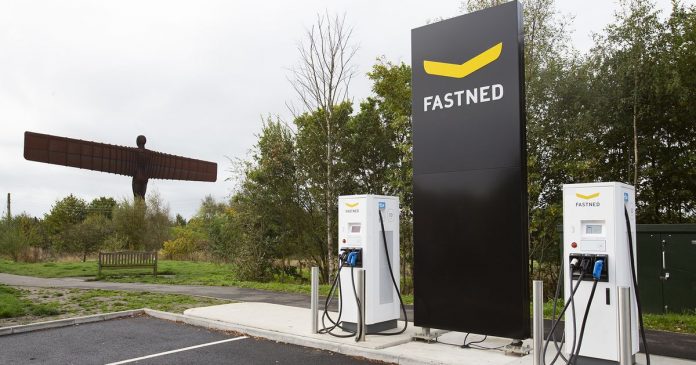Thousands of new electric vehicle charging points will be needed across the North East to meet escalating demand beyond 2030, transport chiefs predict.
There are currently only around 800 publicly accessible charging posts dotted across the region, but that number will need to increase to as many as 28,000 in the coming years. Serious concerns were raised this week over whether that 35-fold uplift can be delivered in time—and whether the North East’s power grid can handle it.
The sale of new petrol and diesel vehicles will be banned in the UK from 2030, with hybrid vehicles to follow in 2035. A report presented to the North East Joint Transport Committee (JTC) earlier this week predicts that, as a result, the demand for electric cars is going to accelerate rapidly.
Read More: Blackett Street pedestrianization plans will need public inquiry before ban on buses can go ahead
Between 64% and 74% of cars and vans are expected to require some form of charging infrastructure by 2035, equating to approximately 800,000 vehicles across Tyne and Wear, County Durham, and Northumberland. The document states that the North East currently has just 2% of the fast-charging infrastructure required to support the expected 2035 demand, and 12% of the ultra-rapid charging posts needed by that date.
At a JTC meeting on Tuesday, the deputy leader of Northumberland County Council aired his fears about whether Northern Powergrid would be able to handle a “huge amount of additional electricity” needed to support such a drastic change in how vehicles are powered. Coun Richard Wearmouth said that he had “a lot of respect” for the operator, but feared that it was not able to do “a lot of forward thinking” towards major infrastructure upgrades.
He added: “I strongly suggest politicians pressing Northern Powergrid to make sure they are prepared for this, because I bet you anything that they aren’t. I have no confidence that they will be able to deliver it without significant investment on their side.”
Richard Wearmouth, deputy leader of Northumberland County Council
The committee agreed to approve a new North East Zero Emission Vehicle Policy, aiming to help boost the uptake of environmentally-friendly vehicles and enable the region to bid competitively for government funding.
Gateshead Council leader Martin Gannon said: “In the future whenever people travel by car or van, we want that vehicle to be electric. For that to happen people must have confidence that they can charge up throughout the North East – whether they are driving in a city or whether they are in remote rural areas. Currently over 60% of trips in our region are by private car. We always encourage people to walk, cycle, or take public transport where that is possible, but in many cases traveling by car or van is the only option.”
The JTC chair added at Tuesday’s meeting that decisions on investment in new electric vehicle infrastructure “need to be made now” to ensure that the right equipment is in place for 2030.
Paul Glendinning, Northern Powergrid’s director of policy and markets, said the company’s latest business plan includes more than £3bn of investment by 2028 to help enable decarbonisation.
He added: “This business plan has been informed by our Distribution Future Energy Scenarios (DFES), which looks at how low carbon technologies, like EVs and heat pumps, are expected to grow in our region so we can invest in our network to support this growth in the coming years and decades. As part of our DFES, we ask local authorities to share their plans and we have also provided input into Northumberland County Council’s own plans. We remain committed to working with our local authority partners and we would be pleased to speak directly with Coun Wearmouth to talk through our plans in more detail.
“We have already encouraged local authorities, other key stakeholders and domestic customers who are planning EV connections to use our free AutoDesign tool which can help them identify the best location to install EV chargers. Using real-world network data, it can help customers quickly find the most viable and cost-effective connection solution to our network.”

